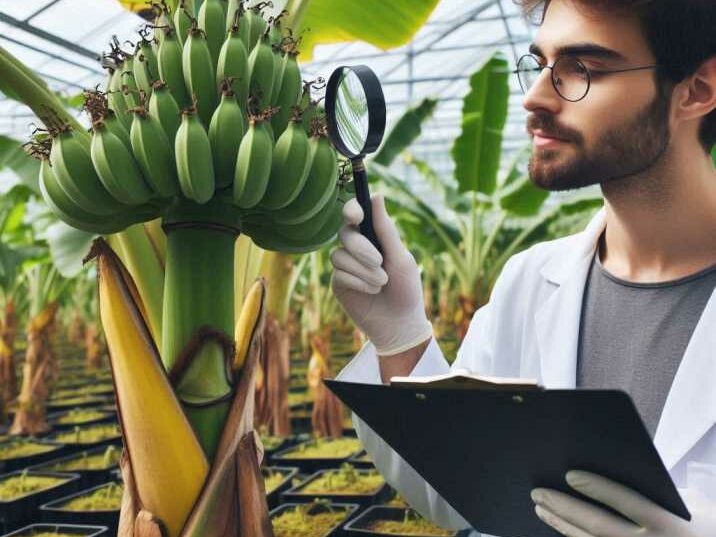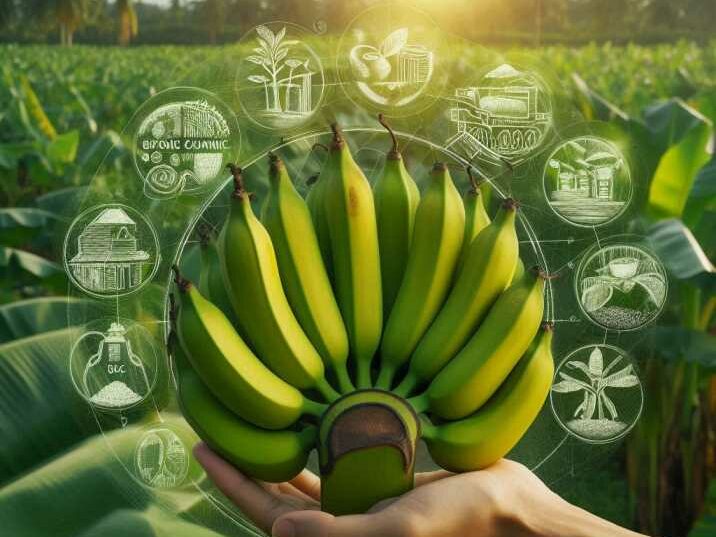Introduction
Table of Contents
In recent years, concerns have arisen about the sustainability of Cavendish bananas, one of the most popular banana varieties worldwide. This article delves into current research initiatives aimed at enhancing the sustainability of Cavendish bananas, exploring innovative approaches and their potential implications for the future.

Research Projects Enhancing Cavendish Banana Sustainability
Project 1: Genetic Diversity and Disease Resistance
Overview: Cavendish bananas are the most widely grown and consumed banana variety globally. However, they are highly susceptible to diseases due to their genetic uniformity. This lack of genetic diversity makes them particularly vulnerable to diseases like Panama disease (Fusarium wilt), which has devastated banana crops worldwide.
Focus of Research:
- Enhancing Genetic Diversity:
- Objective: Researchers aim to increase the genetic diversity within Cavendish banana cultivars. This involves crossbreeding Cavendish bananas with other banana varieties that have natural resistance to diseases.
- Methods: Scientists are using traditional breeding techniques and modern biotechnological tools like gene editing and molecular markers to introduce beneficial traits into Cavendish bananas.
- Disease Resistance:
- Objective: To develop banana plants that are resistant to Panama disease and other pathogens. This involves identifying and incorporating genes that confer disease resistance into Cavendish bananas.
- Methods: Genetic modification and selective breeding are employed to produce plants with enhanced resistance to diseases.
Benefits:
- Increased Resilience: By increasing genetic diversity, Cavendish bananas become less susceptible to diseases, reducing the risk of large-scale crop failures.
- Sustainable Production: Disease-resistant varieties help ensure a stable supply of Cavendish bananas and reduce the need for chemical treatments.
Importance of Genetic Diversity
Definition: Genetic diversity refers to the variety of genes within a plant population. In the context of Cavendish bananas, it means having a range of genetic traits that can help the plants adapt to different environmental conditions and resist diseases.
Why It Matters:
- Disease Resistance:
- Explanation: Monocultures (crops with low genetic diversity) are more susceptible to diseases because a pathogen can easily spread through the uniform population. Increasing genetic diversity helps in creating banana plants with different levels of resistance to diseases.
- Examples: Studies have shown that banana varieties with diverse genetic backgrounds are less likely to be wiped out by a single disease outbreak.
- Adaptability:
- Explanation: Plants with a broad genetic base can better adapt to changing environmental conditions such as shifts in temperature, rainfall, or soil quality.
- Examples: Varieties with different genetic traits might perform better under different conditions, leading to more robust and reliable banana production.
- Long-term Sustainability:
- Explanation: Genetic diversity contributes to the long-term health of banana crops and reduces dependency on chemical inputs for disease management.
- Examples: More resilient plants can thrive with fewer interventions, promoting more sustainable farming practices.
Project 2: Sustainable Farming Practices
Overview: Sustainable farming practices aim to minimize environmental impact while maintaining productive and profitable banana cultivation. Researchers are exploring methods like organic farming and integrated pest management (IPM) to achieve this goal.
Focus of Research:
- Organic Farming:
- Objective: To explore farming methods that avoid synthetic chemicals and promote ecological balance. Organic farming uses natural inputs and processes to grow crops.
- Methods: Organic farming techniques include using natural fertilizers (like compost), biological pest control, and crop rotation to enhance soil health and plant resilience.
- Integrated Pest Management (IPM):
- Objective: To manage pests and diseases using a combination of biological, cultural, physical, and chemical methods in a way that minimizes environmental impact.
- Methods: IPM involves monitoring pest populations, using natural predators, employing physical barriers, and applying targeted chemical treatments only when necessary.
Benefits:
- Environmental Impact:
- Organic Farming: Reduces reliance on chemical pesticides and fertilizers, which can leach into water sources and harm non-target organisms.
- IPM: Minimizes pesticide use by integrating multiple pest management strategies, reducing the risk of pesticide resistance and environmental contamination.
- Long-term Viability:
- Organic Farming: Enhances soil fertility and ecosystem health, supporting sustainable banana production over the long term.
- IPM: Provides a holistic approach to pest management that supports the health of both the crops and the surrounding environment.
Organic Farming vs. Conventional Methods
Comparison:
- Organic Farming:
- Practices: Emphasizes the use of natural methods, such as composting, cover crops, and biological pest control.
- Benefits: Improves soil health, reduces chemical runoff, and supports biodiversity.
- Challenges: Can be more labor-intensive and may require more space for practices like crop rotation.
- Conventional Methods:
- Practices: Often rely on synthetic fertilizers and pesticides to maximize yields and control pests.
- Benefits: Typically allows for higher yields and lower initial costs.
- Challenges: Can lead to soil degradation, increased pesticide resistance, and environmental pollution.

Impact on Sustainability:
Conventional Methods: While effective in the short term, they may lead to environmental issues that undermine long-term sustainability.
Organic Farming: Promotes sustainable practices that support the environment and long-term productivity.
Table of Information
| Research Project | Key Focus | Potential Impact |
|---|---|---|
| Genetic Diversity | Disease resistance | Improved resilience |
| Sustainable Farming Practices | Organic farming, IPM | Reduced environmental impact |
| Climate Adaptation Strategies | Heat and drought tolerance | Increased yield stability |
Ongoing Challenges and Future Prospects
Despite these advancements, challenges such as climate change and market demands continue to shape research directions in Cavendish banana sustainability. Future research aims to address these challenges through innovative technologies and collaborative efforts.
Conclusion
In conclusion, ongoing research projects are pivotal in enhancing Cavendish banana sustainability. By focusing on genetic diversity, sustainable farming practices, and climate adaptation, researchers aim to secure the future of this beloved fruit while promoting environmental stewardship.
FAQs
What is Cavendish banana sustainability?
Cavendish banana sustainability refers to efforts aimed at ensuring the long-term viability of Cavendish banana cultivation through environmentally friendly practices.
Why is genetic diversity important for Cavendish bananas?
Genetic diversity helps Cavendish bananas resist diseases and adapt to changing environmental conditions, ensuring sustainable production.
How does climate change affect Cavendish banana cultivation?
Climate change poses threats such as heat stress and extreme weather events, prompting research into climate-resilient banana varieties.
What are integrated pest management (IPM) practices?
IPM integrates various pest control methods, reducing reliance on chemical pesticides and promoting ecosystem health in banana plantations.
What can consumers do to support sustainable banana production?
Consumers can choose sustainably sourced bananas, support organic farming practices, and stay informed about sustainable agriculture initiatives.
